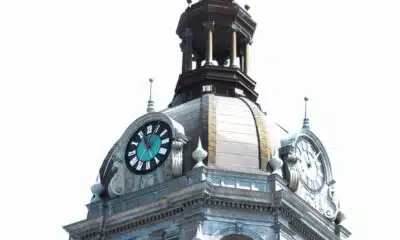News from the South - Louisiana News Feed
AG Pam Bondi sold more than $1 million in Trump Media stock the day sweeping tariffs were announced
by Robert Faturechi and Brandon Roberts, ProPublica, Louisiana Illuminator
May 18, 2025
Attorney General Pam Bondi sold between $1 million and $5 million worth of shares of Trump Media the same day that President Donald Trump unveiled bruising new tariffs that caused the stock market to plummet, according to records obtained Wednesday by ProPublica.
Trump Media, which runs the social media platform Truth Social, fell 13% in the following days, before rebounding.
Trump’s “Liberation Day” press conference from the White House Rose Garden unveiling the tariffs came after the market closed on April 2. Bondi’s disclosure forms showing her Trump Media sales say the transactions were made on April 2 but do not disclose whether they occurred before or after the market closed.
Trades by government officials informed by nonpublic information learned through work could violate the law. But cases against government officials are legally challenging, and in recent years judges have largely narrowed what constitutes illegal insider trading.
It’s unclear from the public record whether Bondi as attorney general would have known in advance any nonpublic details about the tariffs Trump was announcing that day. Trump, of course, publicly announced his plans to institute dramatic tariffs during the election campaign. But during the first weeks of his term, the market seemed to assume his campaign promises were bluster.
The Justice Department did not immediately respond to questions about the trades.
The disclosure forms do not include the specific amount of stocks sold or their worth but instead provide a rough range. The documents do not say exactly what time she sold the shares or at what price. The company’s stock price closed on April 2 at $18.76 and opened the next morning, after the press conference, at $17.92 before falling more in the days ahead. In addition to selling between $1 million and $5 million worth of Trump Media shares, Bondi’s disclosure form shows she also sold between $250,000 and $500,000 worth of warrants in Trump Media, which typically give a holder the right to purchase the shares.
Bondi’s ownership of Trump Media shares has previously been disclosed. Before she became attorney general, Bondi was a consultant for Digital World Acquisition Corp., the special purpose acquisition company that merged with Trump Media to take the president’s social media company public.
As part of her ethics agreement, Bondi had pledged to sell her stake of Trump Media within 90 days of her confirmation, a deadline that would have allowed her until early May to sell the shares.
On April 1, Trump Media filed a disclosure with the Securities and Exchange Commission with details about holdings of various top shareholders, including Trump and Bondi. The purpose of the filing is unclear, as is whether it relates to Bondi’s sales the next day. It appeared to reregister for sale shares held by several of the company’s top shareholders.
Louisiana Illuminator is part of States Newsroom, a nonprofit news network supported by grants and a coalition of donors as a 501c(3) public charity. Louisiana Illuminator maintains editorial independence. Contact Editor Greg LaRose for questions: info@lailluminator.com.
The post AG Pam Bondi sold more than $1 million in Trump Media stock the day sweeping tariffs were announced appeared first on lailluminator.com
Note: The following A.I. based commentary is not part of the original article, reproduced above, but is offered in the hopes that it will promote greater media literacy and critical thinking, by making any potential bias more visible to the reader –Staff Editor.
Political Bias Rating: Center-Left
This article reports on a situation involving Pam Bondi, a U.S. Attorney General, and the possible ethical implications of her stock trades in Trump Media during a critical market moment. The content is investigative in nature, focusing on the financial transactions and their potential conflicts of interest, particularly with regard to insider trading laws. The tone is factual and analytical, drawing attention to the legal and ethical concerns raised by the timing of Bondi’s sales. While the article raises questions about potential misconduct, it does not explicitly accuse her of wrongdoing, maintaining a neutral stance on the issue. The emphasis on transparency and public accountability aligns with a center-left perspective, which often supports scrutiny of public officials’ financial dealings.
News from the South - Louisiana News Feed
Monday Noon Tropics Update: Fernand heads north, Invest 99 fizzles
SUMMARY: Tropical Storm Fernand is improving in organization with 60 MPH winds but faces increasing wind shear and cooler waters as it moves north, likely weakening by Wednesday without threatening land. Invest 99 in the eastern Caribbean remains disorganized with strong wind shear, leading the National Hurricane Center to drop its development chance to 0%. The hurricane season has reached Fernand, with Gabrielle and Humberto next on the list, though no new formations are expected soon. Approaching the peak hurricane season around September 10, activity is likely to continue through September, with cooling temperatures and increased rain chance as fall approaches.
Meteorologist Alexandra Cranford tracks Tropical Storm Fernand and Invest 99 at noon on Monday, August 25, 2025.
News from the South - Louisiana News Feed
Fox 14 Your Morning News: Movement Monday
SUMMARY: Fox 14 Your Morning News’ Movement Monday features partner exercises focused on fun and fitness. The segment includes reverse lunges, one-legged squats, and partner high-five squats to build strength and balance. They use a ball or pillow for back-to-back seated twists and tossing exercises to engage the core. The workout ramps up with side-to-side knee kicks and ab work to boost abdominal strength. Lastly, partners perform planks combined with cardio moves like jumping through feet, emphasizing proper form, breathing, and rhythm to maximize calorie burn and stability. The lively, encouraging approach makes fitness enjoyable and accessible.
Amy returns for another lively installment of ‘Movement Monday,’ which includes a variety of exercises such as reverse lunges, one-legged squats, and planks, all aimed at promoting fitness and teamwork.
News from the South - Louisiana News Feed
3 SAPD officers shoot, kill man while responding to apparent mental health call
SUMMARY: Three Santa Ana Police Department officers shot and killed a man who threatened them with a cutting instrument while responding to a mental health-related 911 call. The incident occurred just before midnight at a hotel on East Houston Street. Police Chief Bill McManus stated that another person reported the man was engaging in self-harm. Officers tried to communicate with the man, who was holding a sharp object, but he threatened and rushed towards them. All three officers then fired, resulting in the man’s death. No other individuals were harmed during the incident.
A 34-year-old man was shot and killed by three San Antonio police officers while responding to an apparent mental health call.
Editor’s Note: This story includes discussion of self-harm. If you or someone you know needs help, please call 9-8-8.
-
News from the South - Alabama News Feed7 days ago
U.S. agriculture secretary announces end to subsidies for solar panels on farmland
-
News from the South - Kentucky News Feed6 days ago
First of its kind clinical trial offers new hope for Kentuckians at risk of dementia
-
News from the South - West Virginia News Feed7 days ago
Free AI testing platform rolled out to federal employees
-
News from the South - Arkansas News Feed6 days ago
Cities across the US are embracing AI guidelines for local government workers
-
News from the South - Georgia News Feed7 days ago
Don't eat this shrimp sold at Walmart due to possible radiation contamination: FDA
-
News from the South - Alabama News Feed6 days ago
Grants to boost local emergency alert systems in question as public media agency closes
-
News from the South - Arkansas News Feed6 days ago
‘Alligator Alcatraz’ probed by Dems as ICE detention centers multiply in states
-
News from the South - Arkansas News Feed4 days ago
New I-55 bridge between Arkansas, Tennessee named after region’s three ‘Kings’












































